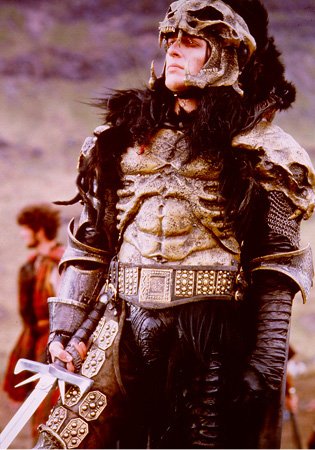First things first: The Eagle is nowhere near as bad as the marketing made it out to be: there's no Godsmack in the soundtrack, there are some interesting themes about the nature of slavery and cultural identity, and its a fun, well-acted romp with some gorgeous Scottish scenery.
Okay, it's not perfect: it seems to be employing some sort of reverse-Bechdel Test where women are shown for less than a minute of the film with no dialogue, and the plot takes some strange leaps where the audience has to believe that Caledonian tribesman can run faster than two dudes on Horseback. But it isn't terrible, and it's pretty fun to watch.
It isn't even all that historically inaccurate, at least not as far as I can tell: there are a few nitpicky points I could make, but they don't really serve to sink the film. It's certainly no King Arthur, which not only had the gumption to be terrible but was also rife with bizarre anachronisms (like having the Anglo-Saxons invading Berwickshire instead of, y'know, England!) whilst claiming- in-movie, no less- to be a faithful interpretation of historical events.
But there is one thing that the Eagle shares with King Arthur, and Braveheart, and Highlander, and just about every film set in pre-modern Scotland: it confuses ancient Caledonia with the Chaos Wastes


Hadrian's Wall was, to some extent, a cultural frontier, a way of dividing Roman-occupied Britain from the unconquered north. It was also a means of projecting power upon an unruly province that required four legions to be stationed there- the same number as guarded the Rhine, Danube and Persian frontiers. It was also a customs barrier that controlled trade and immigration between both sides, not unlike the frontiers between the US and Mexico today. It was not primarily a defensive fortification, and it certainly was not the edge of the Roman world. There were no signs saying "Caledonia: No Civilisation for one hundred miles": there were almost certainly Romans and British living and working on both sides of the wall. It is not true that "no Roman can survive north of the wall," as if the very air was a poisonous fume and the frontier was patrolled by Shelob.
To whit: why do films insist on presenting Northern Britain as a barren near-tundra filled with fur-clad- or in this case- almost nude savages? The Caledonians of the Eagle are shaven headed, mohawked and painted so that they look like the Na'vi crossed with hardcore punks. Visually they have more in common with Zulus than Asterix, which gives some of the fight-scenes an eerily racially-charged imagery to them. And they sleep outdoors, uncovered, despite the fact they live (apparently) on the West coast of Scotland and it's winter, judging by the constant rain, snow and fog.
On the subject of the whether: this film was made by Film 4, a British company. It stars Jamie Bell, who's from Stockton on Tees, for God's sake! It was even filmed, on location, in Scotland. Did no one tell the producers that Northern Britain is not constantly assaulted by the elements, and that when the weather is bad even Geordies do not sleep outside wearing loincloths? For that matter, why not head north during the summer to find the aquila? The weather would be better, and you'd have more hours of daylight available.
I know it's more dramatic to contrast the civilised south with the barbaric north, and would like to reiterate that this is not King Arthur, where the Grampians were somehow confused with the Alps to ensure the film could be comprehended by an audience unfamiliar with Britain's geography. This film at least presents Scotland as it is. But it focuses only on the highlands at their most inclement whilst presenting the people as utterly divorced from reality as possible, even by the standards of the somewhat biased accounts of the British people provided by the Romans.
It's a little thing, really: the film isn't bad, or even all that inaccurate. Maybe I'm being oversensitive, as might be expected of a northerner by birth who lived in Scotland for six years. But it reinforces the ancient view held by many people who have never visited northern Britain that it is a land apart, a land of beautiful scenery but hostile weather, full of savage brutes that do little but drink and fight and don't wear enough clothes in winter. There's some truth in the stereotype, but it still needs to be challenged, not reinforced, especially in an age of government cuts where the ruling government is dominated by middle-class southerners who do not understand the needs of the North.
I might be over-thinking this: here's a fanservice shot of Jamie Bell to make up for it.

No comments:
Post a Comment